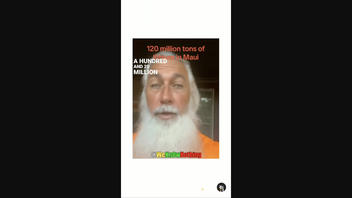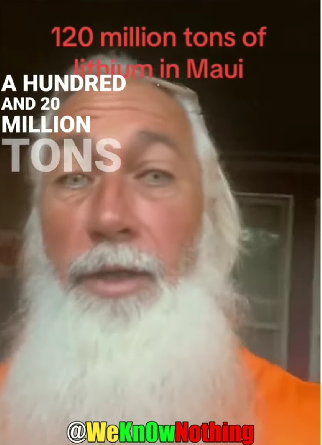
Were the 2023 Maui wildfires started because the island holds 120 million tons of lithium? No, that's not true: A U.S. Geological Survey representative and an associate professor emeritus of geology both said there is no evidence that there is that much lithium in Maui or throughout the Hawaiian islands. Lithium is mainly found in Australia, South America and Nevada, the professor said.
The claim appeared on Instagram (archived here) on September 17, 2023. It opened with a bearded man speaking to the camera:
A hundred and twenty million tons of lithium in Maui. I don't think we need to wonder why they did what they did there.
This is what the Instagram post looked like at the time of writing:
(Source: Instagram screenshot taken on Tue Sep 26 16:47:13 2023 UTC)
The unidentified man says lithium is used in cars and computers and these fires purportedly happened because "Somebody with some money wanted some more money."
Neither the man speaking nor the post itself provides any evidence to substantiate the claim.
A Google search of the phrase, "120 million tons lithium Maui" (archived here) did not yield any significant results. Investigators were still working at the time of writing to investigate the causes of the fires, according to The Associated Press (archived here).
Lead Stories asked the U.S. Geological Survey (USGS) if "120 million tons" was accurate for the amount of lithium in Maui's soil. In a September 26, 2023, email, Alex Demas, a public affairs specialist for the USGS, told us that that number likely comes from a recent discovery of lithium in Nevada:
... we have no report saying there is a significant amount of lithium in Hawaii. That number, 120 million tons of lithium, likely comes from a recent discovery of lithium in northern Nevada.
Demas provided an article (archived here) from the August 2023 issue of Science Advances with his response. The article states that researchers found 120 million tons of lithium in the McDermitt caldera in southeastern Oregon and northern Nevada. A caldera is a bowl-shaped hole in the ground caused by a volcano erupting and then collapsing.
Lead Stories emailed Michael McKibben (archived here), an associate professor emeritus of geology at University of California, Riverside, about this claim. McKibben responded by email on September 26, 2023, writing ("Li" is an abbreviation for lithium. Parentheses are verbatim from the email):
There are no significant Li resources anywhere in the world associated with basaltic volcanism, including Hawaii. All Li is associated with granitic and rhyolitic volcanism and sediments derived therefrom, which is at the opposite compositional spectrum from basalt. Basalt is silica-poor, granite and rhyolite are silica-rich. Li is found mainly in granitic rocks like pegmatite (in Australia), and in saline lake sediments derived from the erosion of rhyolitic volcanic rocks (in South America and Nevada). Australia, Chile and Argentina are the biggest producers of Li in the world. Li resources in the U.S. are mainly found in claystones derived from rhyolitic calderas in Neveda.
The McDermitt caldera in the Nevada-Oregon region has rhyolitic volcanic rocks in it, according to the USGS.
Other Lead Stories articles on claims related to the Maui wildfires are here.


















